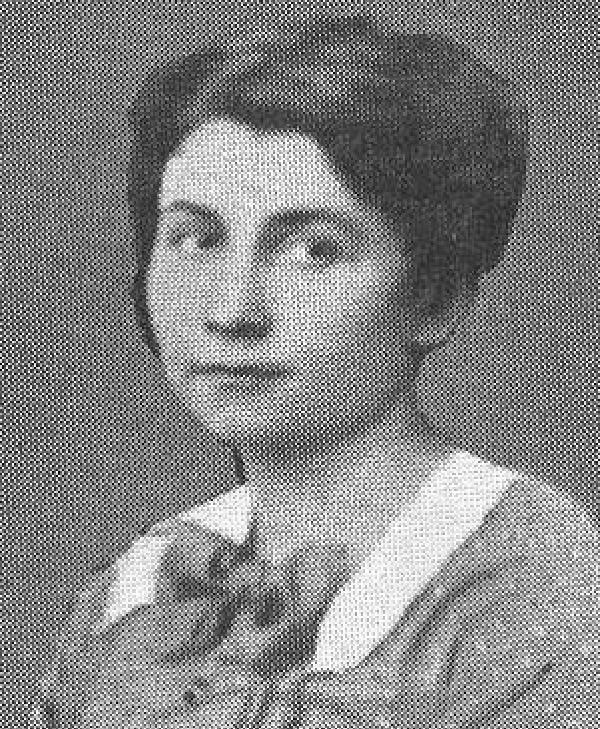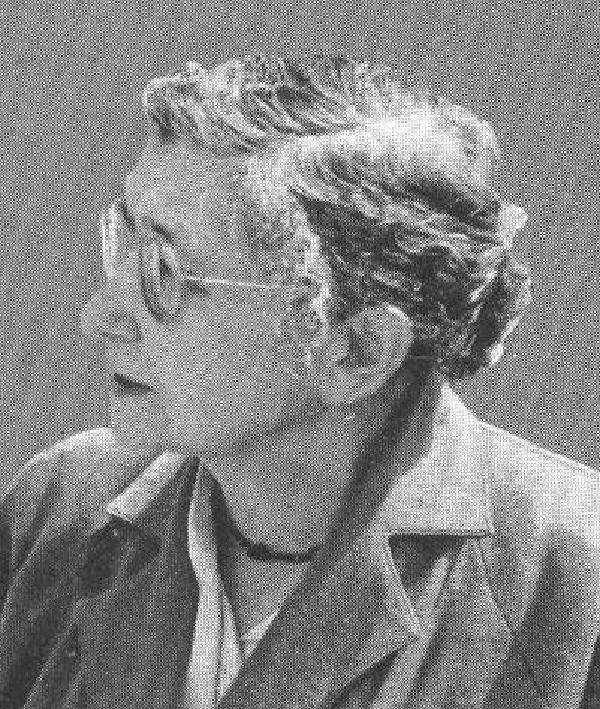Klara Marie Fassbinder was born in Trier on 15 February 1890 and grew up as the fifth of seven
children in a Catholic family loyal to the Kaiser. Nevertheless, the family of teachers was open to
social and political issues and six of the seven siblings pursued careers as teachers.
Another reason for Klara Fassbinder to become a teacher was her quick comprehension skill,
which caused her to clash with other children and made her want to be a fair teacher for future
generations. Thus, at the age of 16, she enrolled in the Higher Teacher Training Seminar in
Koblenz and three years later she obtained her teaching diploma for middle and high schools for
girls. After another three years, during which she worked as a teacher in Darmstadt, she managed
to complete her external high school diploma in Prussian Münster in 1913, which allowed her to
become one of the first female students at the University of Bonn.
In 1917, she passed her state exam for higher education in French, German, history, and
philosophy and subsequently obtained a doctorate in Romance studies.
Peace activist, pacifist, professor
Consequences of war
Although Klara Fassbinder had a deep understanding of the French language, this did not reflect
her attitude towards the country. She held a negative attitude towards France, which led her to
voluntarily join the war effort in 1918 as an officer rank speaker, firmly convinced that Germany
would win the war.
In the army, she was deployed to the Western Front in the French Ardennes to boost the troops' morale. She provided "patriotic education", organized church concerts as well as discussion evenings, and put together a small lending library.
It was only when she was confronted with the suffering of the people at the front that protest arose in her and her ideas changed abruptly. For she was also employed as a mediator between the French population and the German occupying army. She was thus in direct contact with the French population, which she got to know better and no longer recognised as the "hereditary enemy".
In the end, she changed from a determined nationalist to an advocate of Franco-German friendship and pacifism. In retrospect, she often wondered how she could have been blind for so long.
In the army, she was deployed to the Western Front in the French Ardennes to boost the troops' morale. She provided "patriotic education", organized church concerts as well as discussion evenings, and put together a small lending library.
It was only when she was confronted with the suffering of the people at the front that protest arose in her and her ideas changed abruptly. For she was also employed as a mediator between the French population and the German occupying army. She was thus in direct contact with the French population, which she got to know better and no longer recognised as the "hereditary enemy".
In the end, she changed from a determined nationalist to an advocate of Franco-German friendship and pacifism. In retrospect, she often wondered how she could have been blind for so long.
Women's & Peace Movement
Before World War I, Klara Marie Fassbinder was convinced that it would be better not to
participate in politics and and women's suffrage did not seem to be an important issue for her
either. However, after returning from the war, the discussion became more prominent, until she
joined the women's movement at the International Women's Suffrage Congress in Paris in 1926.
At this congress, she was elected to the Peace Committee and has since been committed to
gender equality.
After Konrad Adenauer aimed to rearm the Federal Republic from 1950 onwards, Fassbinder joined the peace movement and campaigned for understanding with the East and for the reunification of Germany. Due to her clear pacifist stance, she was spied on by the intelligence service under the pretext of spreading pro-communist statements, and in 1953 a official proceeding was opened against her. This was closed due to groundless accusations, but Klara Fassbinder was suspended from her post and sent into early retirement on the instructions of the then Minister of Education.
Despite numerous hostilities, she continued to advocate for the peace movement and remained tirelessly true to her values.
After Konrad Adenauer aimed to rearm the Federal Republic from 1950 onwards, Fassbinder joined the peace movement and campaigned for understanding with the East and for the reunification of Germany. Due to her clear pacifist stance, she was spied on by the intelligence service under the pretext of spreading pro-communist statements, and in 1953 a official proceeding was opened against her. This was closed due to groundless accusations, but Klara Fassbinder was suspended from her post and sent into early retirement on the instructions of the then Minister of Education.
Despite numerous hostilities, she continued to advocate for the peace movement and remained tirelessly true to her values.
click around to close
Occupation as teacher and professor
After returning from World War I, Klara Marie Fassbinder actively worked towards reconciliation
with France and therefore decided to move to Saarland in 1920, which at that time was still under
French occupation. There, she taught at a school in Saarbrücken and later became the head of the
"Bühnenvolksbund", an organization that aimed to make theatre more accessible to all social
classes.
Due to her publicly critical attitude towards the Nazi Reich, she was dismissed without notice in 1935 after the Saarland was annexed by Germany. Contrary to the advice of her French friends, she did not flee to neighbouring France but instead stayed in Germany to become the head of a small Catholic school for girls. After it was closed, Fassbinder continued to give private lessons and kept her head above water financially by translating Paul Claudel's works.
However, when the war ended, she returned as headmistress to the girls' school and at the same time became a professor of history at the Pedagogical Academy in Bonn. She placed particular emphasis on analyzing recent events in order to teach her students how they came about and how to prevent a recurrence.
She taught there until her teaching license was revoked due to her clear political stance and she was forcibly retired against her will. Despite numerous protests from her students, she was no longer allowed to enter the university and was not granted a farewell lecture. However, this did not stop her from giving her lecture "Schluss mit Deutschland" (engl. “No more Germany”) in front of 800 students in the university cafeteria in 1967.
She was rehabilitated by the Minister of Education, Prof. Paul Luchtenberg, in 1957, which is reflected in an acknowledgement in her retirement certificate.
Due to her publicly critical attitude towards the Nazi Reich, she was dismissed without notice in 1935 after the Saarland was annexed by Germany. Contrary to the advice of her French friends, she did not flee to neighbouring France but instead stayed in Germany to become the head of a small Catholic school for girls. After it was closed, Fassbinder continued to give private lessons and kept her head above water financially by translating Paul Claudel's works.
However, when the war ended, she returned as headmistress to the girls' school and at the same time became a professor of history at the Pedagogical Academy in Bonn. She placed particular emphasis on analyzing recent events in order to teach her students how they came about and how to prevent a recurrence.
She taught there until her teaching license was revoked due to her clear political stance and she was forcibly retired against her will. Despite numerous protests from her students, she was no longer allowed to enter the university and was not granted a farewell lecture. However, this did not stop her from giving her lecture "Schluss mit Deutschland" (engl. “No more Germany”) in front of 800 students in the university cafeteria in 1967.
She was rehabilitated by the Minister of Education, Prof. Paul Luchtenberg, in 1957, which is reflected in an acknowledgement in her retirement certificate.
Disputed awards
In 1919, she was to be awarded with the Iron Cross, but she declined it as it no longer fit with her
pacifist worldview.
Through her efforts for the German-French friendship and as a translator of Paul Claudel, she was to be awarded the French "Ordre des Palmes Académiques" in 1966. This is one of the highest honours in France for achievements in education. However, the then Federal President of Germany, Heinrich Lübke, forbade her from accepting the award, leading to a political scandal and great attention. Only after Gustav Heinemann was appointed as the new President was she able to accept the award.
At the age of 84, Klara Marie Fassbinder died in a retirement home in Berkum near Bonn. One of her last wishes was to be buried with the awarded order.
Through her efforts for the German-French friendship and as a translator of Paul Claudel, she was to be awarded the French "Ordre des Palmes Académiques" in 1966. This is one of the highest honours in France for achievements in education. However, the then Federal President of Germany, Heinrich Lübke, forbade her from accepting the award, leading to a political scandal and great attention. Only after Gustav Heinemann was appointed as the new President was she able to accept the award.
At the age of 84, Klara Marie Fassbinder died in a retirement home in Berkum near Bonn. One of her last wishes was to be buried with the awarded order.




